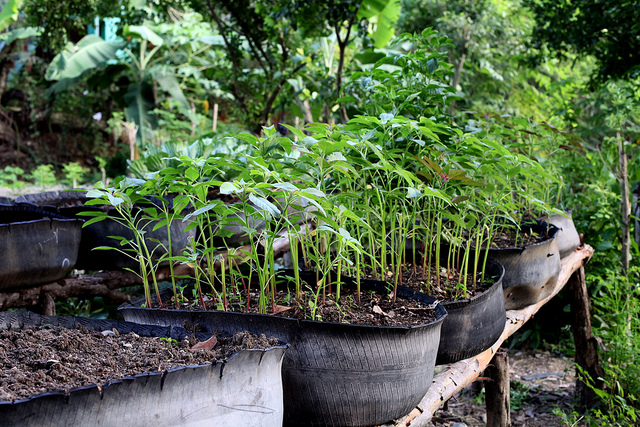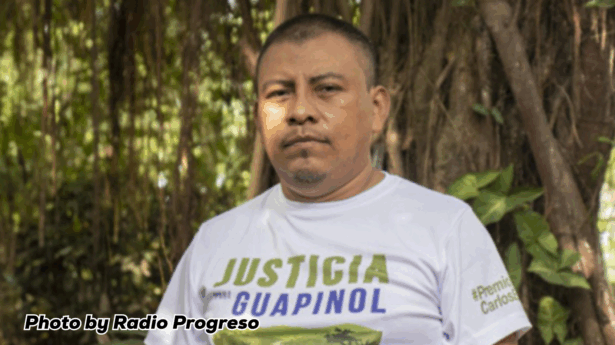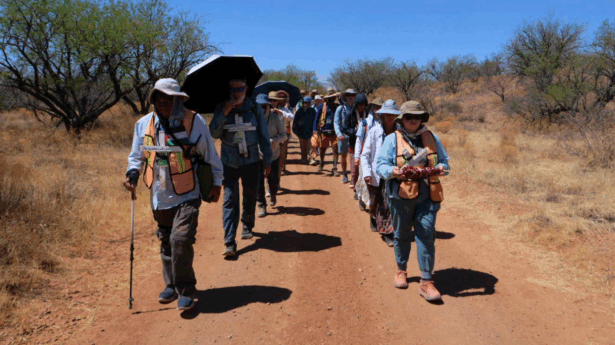The Unitarian Universalist Service Committee advances human rights through grassroots collaborations.
Ending Food Insecurity, One Urban Tire Garden at a Time

September 4, 2013
Originally published in the Summer/Fall 2013 issue of Rights Now
“If it’s not impossible, we will be able to do it.” That was the response of four youths to Chavannes Jean-Baptiste, founder and leader of Haiti’s Papaye Peasant Movement (MPP), when he told them that it would be difficult to bring tire gardens from the countryside into Port-au-Prince. They were right that they could do it. They formed the Bright Educators of Delmas (known by its Haitian acronym, GEAD), and with UUSC support, the four young leaders embarked on an urban agriculture pilot project that has had great success — and is poised for its next phase of growth.
Tire gardens: the what and the why
Tire gardens, which GEAD discovered at MPP headquarters during a community organizing training, use old tires recycled into efficient home garden planters. The tires are turned inside out; fitted with a solid base; filled with a mixture of dirt, compost, and sand; and raised up on stilts to keep them out of reach of animals (and to allow greater light exposure in the city).
People grow tomatoes, cabbage, bell peppers, carrots, onions, eggplant, and more; they harvest seeds for future planting and rotate crops amongst the tire planters to ensure greater soil productivity. The process uses organic farming methods, avoiding the expense, potential dangers, and environmental toll of fertilizers and pesticides. And just five tire gardens can feed a family of four for a year.
The concept of personal home gardens — in the city and in the countryside — carries great significance in a country where food security is hard to find. According to the U.N. Office for the Coordination of Humanitarian Affairs, 6.7 of the 10 million people in Haiti don’t have enough to eat or have access to adequate nutrition. It’s in this context that MPP developed the tire garden model to enable its members to successfully cultivate vegetables for their own consumption and to sell at market.
Success in the city
GEAD was determined to introduce the concept in Port-au-Prince. After MPP trained them in garden construction and growing methods, GEAD worked with UUSC to bring the gardens to 48 families in the Delmas neighborhood of Port-au-Prince. They offered more than just the raw materials, though. As Danielle Neus, GEAD spokesperson, says, “It’s not about just making the gardens, it’s about training [the families] to understand how to feed themselves.”
GEAD worked with the families to plant the first vegetables of pilot project in August 2012. Wendy Flick, manager of UUSC’s Haiti Program, reports, “They have had unbelievable success so far.” Families are growing vegetables with enthusiasm, enjoying ready access to healthy food, and spreading the word to their neighbors, who are eager to join the movement.
This fits right into GEAD’s vision, as explained by Coordinator Emmanuel Exuma: “GEAD’s dream is to see the majority of people in Port-au-Prince have the possibility of not buying vegetables in the market anymore. They could just go pick the vegetables in their garden.”
Urban training center in development
That vision means the first 48 families are just the beginning — and it also means that GEAD needs space to grow. On the horizon: construction of a tire-garden training center in the city. Neus breaks it down: “The next step for GEAD is to have its own center so that we can train young people — not just train them so that they can go out and earn a living, but put the ideas deep inside of them so that they understand that they have their part to play and that it’s important.”
GEAD is currently identifying a suitable piece of land for the center. The site will include a training facility, model garden, storage for tools and materials, and an area for manufacturing their own compost, which is currently being imported from Papaye. One of the groups GEAD plans to train once the center opens is another UUSC partner, Zanmi Timoun, which works with survivors of child slavery and trafficking to reintegrate them into society.
Into the future
The connections that people form may be one of the greatest products of this process — aside from the much-needed food. This is not lost on GEAD; in fact, it’s key to their approach. GEAD Secretary Guerna Salomon says, “Unity is everything. With union, we can go further.” And they are already on their way.
Neus reflects on the future: “The dream is becoming a reality, but we have much to do. We’ll need the support of a lot of people. Not just to help us realize the center or even to help us realize other tire gardens. We need the support of all the youth — worldwide — because this is something that concerns not just us but everyone in the world.”

